A Thailand court has suspended the prime minister, but he will stay on as the defense minister

A few minutes every morning is all you need.
Stay up to date on the world's Headlines and Human Stories. It's fun, it's factual, it's fluff-free.
Since 2014, Prayuth Chan-ocha has been the prime minister of Thailand. As an ex-army chief, Prayuth took over by leading a military coup, and then, during a controversial 2019 election, he won the office again. Under his direction, the constitution was rewritten to include a prime minister term limit of eight years. This year, Prayuth has held onto his position despite four no-confidence votes; he’s been criticized for authoritarianism and making inequality worse throughout the country. Recently, opposition parties argued to the courts for Prayuth to be removed, saying he’s already overstayed his term limit.
Last Wednesday, Thai courts agreed to hear the case. The court voted to suspend him as prime minister temporarily, but he will stay on as Thailand’s defense minister in the meantime. Now the court will consider the case to decide if he broke the eight-year term limit. Did Prayuth’s rule start in 2014, when he took power? Or did it officially begin in 2017, when the constitution was rewritten? Or maybe in 2019, after he was first officially elected? In the meantime, Deputy Prime Minister Prawit Wongsuwan has stepped up as acting prime minister. Thailand will hold its next election in March next year, but the sitting prime minister can call an early election if they choose. Thailand’s Constitutional Court has not given a time frame on when to expect a ruling, but Prayuth has 15 days from his suspension to respond to the court’s decision.
Key comments:
“The court has considered the petition and related documents and sees that the facts from the petition are cause for questioning as demanded," said Thailand’s Constitutional Court regarding the filing to consider Prayuth’s term limit.
“Prime Minister Prayuth also urged the people to respect the decision of the court and avoid criticizing the decision that could further create division," said government spokesperson Anucha Burapachaisri, confirming that Prayuth respected the court’s decision and would be stepping down.
“There have been some economic mismanagement, politics is still polarized, since over the past eight years since he’s been prime minister – or since he’s been called as the prime minister – Thailand has not done well," said Thitinan Pongsudhirak, a professor at Chulalongkorn University in Bangkok.
“The power that Prayuth seized eight years ago has very much declined," said Prinya Thaewanarumitkul, a law professor at Thammasat University. “The suspension came despite previous favorable rulings in the coupmaker’s favor, making people anxious about what’s going to happen next."




Comments ()